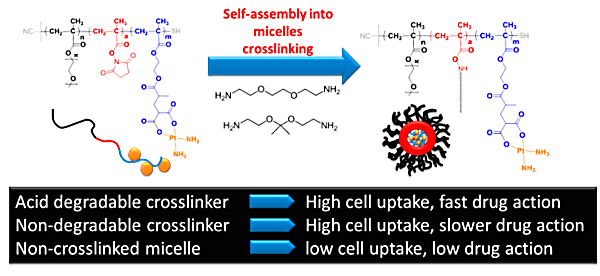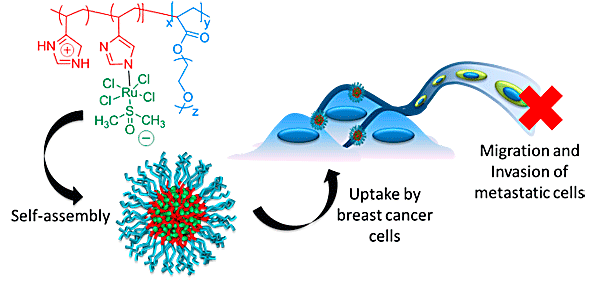Polymers for Health 2
Drug delivery carriers for metal-based drugs
Investigator:
Prof Martina Stenzel
Collaborator:
Prof Paul de Souza (UWS)
Funding: ARC discovery and ARC Future Fellowship
Metal-based anticancer drugs, in particular platinum-drugs, have been investigated for the treatment of cancer for the last 40 years. A small set of platinum-based drugs have meanwhile received FDA approval for the treatment of various cancer. Cisplatin and its relatives are currently one of the most widely used anticancer drugs. The use is however associated with significant side effects and rising drug resistance. To combat these problems, drug delivery carriers have been developed to increase the protection of the drug and increase efficacy. Metal-based drugs represent a rather unique drug delivery challenge. Most anti-cancer drugs are either physically encapsulated into a polymer matrix or they can be conjugated to the polymer via a degradable linker. While both pathways are possible for metal-based drugs, the conjugation to the polymer can be carried via labile or permanent ligands. In addition, the prodrug strategy using the drug in the higher oxidation state is a common approach that has been widely tested for platinum drug. The delivery of platinum drugs is now a mature field and the various conjugation techniques have been combined with a range of drug carriers including dendrimers, micelles and solid polymer nanoparticles. Hybrids of macromolecular metal complexes with inorganic nanoparticles have been tested in recent years to combine the ability to deliver the drug with imaging properties. An emerging trend is the surface decoration of the polymeric nanoparticles with targeting ligands such as folates. The advanced state of this field is evident by the fact that some macromolecular platinum drugs even advanced in the clinic. While the delivery of platinum drugs has been well explored, the delivery of other metal-based drugs based on gold, ruthenium or cobalt are still in their infancy.

Crosslinked micelles for the delivery of cisplatin
In our lab, we are interested in designing drug carriers tailored for various metal-based cancer drugs. A large area of activity is focused on developing suitable carriers for cisplatin and other platinum drugs. However, we have extended our portfolio to drugs based on ruthenium and gold, as a less toxic alternative to cisplatin.

A drug carrier for the ruthenium drug RAPTA-C
References
- Huynh, V. T.; Quek, J. Y.; de Souza, P. L.; Stenzel, M. H., Block Copolymer Micelles with Pendant Bifunctional Chelator for Platinum Drugs: Effect of Spacer Length on the Viability of Tumor Cells. Biomacromolecules 2012, 13 (4), 1010-1023.
- Huynh, V. T.; Binauld, S.; de Souza, P. L.; Stenzel, M. H., Acid Degradable Cross-Linked Micelles for the Delivery of Cisplatin: A Comparison with Non-degradable Cross-Linker. Chem. Mat. 2012, 24 (16), 3197-3211.
- Scarano, W.; Duong, H. T. T.; Lu, H. X.; De Souza, P. L.; Stenzel, M. H., Folate Conjugation to Polymeric Micelles via Boronic Acid Ester to Deliver Platinum Drugs to Ovarian Cancer Cell Lines. Biomacromolecules 2013, 14 (4), 962-975.
- Pearson, S.; Scarano, W.; Stenzel, M. H., Micelles based on gold-glycopolymer complexes as new chemotherapy drug delivery agents. Chem. Commun. 2012, 48 (39), 4695-4697.
- Blunden, B.; Lu, H.; Stenzel, M. H. Enhanced Delivery of the Ruthenium Drug RAPTA-C as Macromolecular Chemotherapeutics by Conjugation to Degradable Polymeric Micelles, Biomacromolecules 2014, accepted
